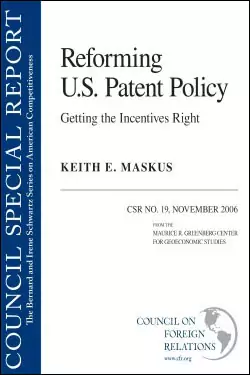
Reforming U.S. Patent Policy
Getting the Incentives Right

- Council Special Report
- Concise policy briefs that provide timely responses to developing crises or contributions to current policy dilemmas.
Overview
The conversation on American competitiveness is often intertwined with the conversation on innovation.
The liberalization of trade and the increasing influence of emerging markets such as China and India have meant that U.S. innovation is now competing globally. This global competition has raised awareness and concerns not only that our trading partners are lax on patent enforcement, but also that our patent system may not be optimally suited to compete on the global economic stage.
More on:
In this Council Special Report, Keith E. Maskus offers a fair, thoughtful, and at times counterintuitive account of this issue. He recognizes the importance of patent protection for innovation but also warns against blind adherence to the mantra that more protection will necessarily produce more innovation. He highlights the numerous friction points in the patent system and recommends policy options to smooth them out and to keep our patent system competitive. While acknowledging concerns about patent infringement in emerging markets, he expresses deep skepticism of U.S. efforts to harmonize patent standards through trade negotiations. In its place, he proposes a grand bargain in which the developed world requires emerging markets to enforce patents in exchange for agreeing to relax efforts to tighten global patent standards.
Part of the Bernard and Irene Schwartz Series on American Competitiveness.
More on:
 Online Store
Online Store